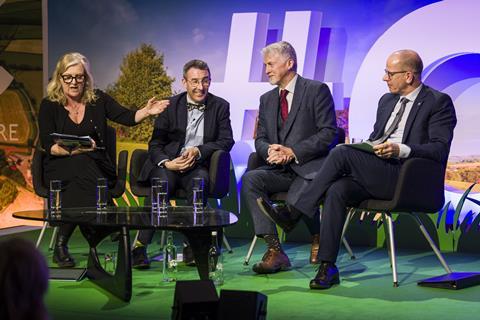Jim Fairlie, Huw Irranca-Davies and Andrew Muir discussed key challenges and priorities as Scotland, Wales and Northern Ireland adjust to life outside the EU’s Common Agricultural Policy

The farming ministers of Scotland, Wales and Northern Ireland stressed the importance of collaboration in their countries’ post-Brexit transition to alternative support schemes at the Oxford Farming Conference on 9 January.
Scotland’s minister for agriculture and connectivity, Jim Fairlie, said that against a backdrop of considerable challenges, “calm heads, considered thinking, and collaboration” with the various farming sectors are what is needed to steer Scotland “back onto a path of recovery and restoration”.
Fairlie said: “It has never been more essential that the rural voice is heard as we face up to the damaging effects of climate change, global conflict, the disaster of Brexit that Scotland did not vote for, and the rise of populism that has started to get hold right around the whole of the UK.”
The MSP for Perthshire South and Kinross-shire explained that developing new agricultural policy for Scotland since Brexit has been done in collaboration with farmers and land managers to help deliver climate adaptation and mitigation, sustainable food production, biodiversity recovery, and nature restoration.
However, he stressed that government policymakers and farmers are “not going to agree on everything, and realising our ambition for a sustainable sector and meeting our climate and nature obligations is going to be hard”.
When it comes to Scotland’s agricultural budget, he urged Westminster to move to delivering funding on a multi-annual basis “to reflect the long-term nature of farming”.
“Instead of the long-term funding certainty that was available during our EU membership, we’ve now got an inadequate settlement within the United Kingdom, which applies a population formula for land-based support,” he said.
“That fails to recognise Scotland’s greater share of the UK land mass. And the potential that that land has to contribute significantly to the UK’s climate and nature restoration targets, and to UK food security.”
The Budget also set out changes to inheritance tax, Fairlie said, but pointed out that not only owner-occupiers are going to be affected in Scotland, but the tenants as well.
“We’ve raised this with the Treasury, and we will continue that pressure to get this damaging decision reversed,” he said.
Fairlie called for “a proper dialogue and impact assessments to find a fair tax system that respects the devolution settlement and does not wreck the livelihoods of the people who keep this country afloat”.
Wales
Following Fairlie’s speech, Fairlie’s Welsh counterpart Huw Irranca-Davies, emphasised that climate change – which will only intensify – affects all of Wales’ farms, including their soils and their waterways.
He pointed out that this winter Wales was hit by two storms in quick succession, with damaging short and long-term effects.
“We’ve got to act today to face these impacts and to help ensure the future of a resilient industry is really robust and really secure,” Irranca-Davies said.
He confirmed that the Welsh Government plans to introduce its Sustainable Farming Scheme (SFS) in 2026 – to support Welsh farmers with sustainable food production, climate change mitigation and adaptation, and maintaining and enhancing nature on their farms.
He said BPS payments were made to all eligible farmers in Wales in 2024, totalling over £228 million. And he confirmed that payments would stay at the same level in 2025, as promised.
Irranca-Davies added that the UK Budget in October included the full amount of funding allocated for replacement farm funding for Wales in 2024/25.
And he said: “I’m pleased that we’re investing £118 million through our rural investment schemes alongside BPS. Many of these schemes, including the Habitat Wales Scheme, are key parts of the SFS preparatory phase in 2025.”
Northern Ireland
Finally, Andrew Muir, Northern Ireland’s minister of agriculture, environment and rural affairs, stressed the work and resources required to navigate post-Brexit trading rules and implement schemes to replace the EU’s CAP were “significant and onerous”. But he said the Northern Irish government was “getting on with the work”.
“My department’s new farm support and development programme is being co-designed with key agriculture and environmental stakeholders to target farm support to the bespoke needs of Northern Ireland,” Muir said.
The delivery of the programme will be essential in addressing phosphorous and ammonia-related issues, he highlighted, following water pollution in Loch Neagh in the past two years.



